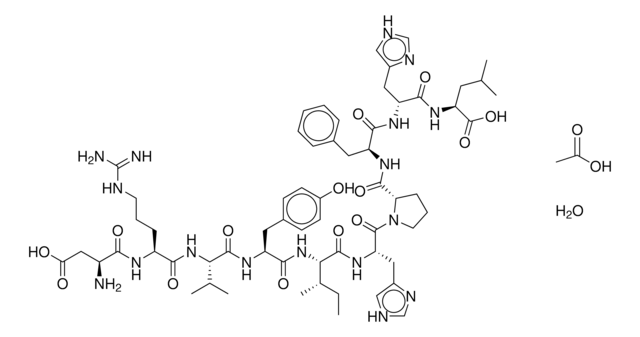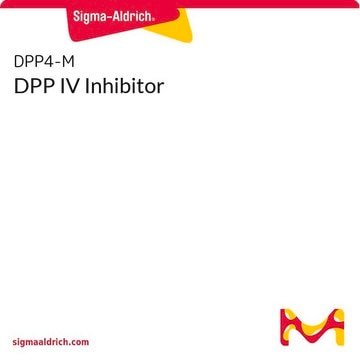S6135
Somatostatin 28
≥97% (HPLC)
Sinónimos:
Prosomatostatin
About This Item
Productos recomendados
Quality Level
assay
≥97% (HPLC)
form
powder
mol wt
3148.56
storage condition
(Keep container tightly closed in a dry and well-ventilated place)
concentration
>70% (peptide content)
technique(s)
activity assay: suitable
solubility
water: 1 mg/mL, clear, colorless
UniProt accession no.
storage temp.
−20°C
SMILES string
CSCCC(NC(=O)C(C)NC(=O)C1CCCN1C(=O)C(CC(N)=O)NC(=O)C(CO)NC(=O)C(CC(N)=O)NC(=O)C(C)NC(=O)C(N)CO)C(=O)NC(C)C(=O)N2CCCC2C(=O)NC(CCCNC(N)=N)C(=O)NC(CCC(O)=O)C(=O)NC(CCCNC(N)=N)C(=O)NC(CCCCN)C(=O)NC(C)C(=O)NCC(=O)NC3CSSCC(NC(=O)C(CO)NC(=O)C(NC(=O)C(Cc4ccccc4)NC(=O)C(NC(=O)C(CCCCN)NC(=O)C(Cc5c[nH]c6ccccc56)NC(=O)C(Cc7ccccc7)NC(=O)C(Cc8ccccc8)NC(=O)C(CC(N)=O)NC(=O)C(CCCCN)NC3=O)C(C)O)C(C)O)C(O)=O
InChI
1S/C137H207N41O39S3/c1-69(154-113(194)82(37-19-22-47-138)159-115(196)85(40-25-50-149-136(145)146)160-118(199)87(44-45-106(188)189)163-116(197)86(41-26-51-150-137(147)148)164-130(211)101-43-27-52-177(101)133(214)72(4)156-114(195)88(46-54-218-7)158-110(191)71(3)155-129(210)100-42-28-53-178(100)134(215)95(61-104(144)186)171-126(207)96(65-180)172-124(205)93(59-102(142)184)165-111(192)70(2)153-112(193)80(141)64-179)109(190)152-63-105(187)157-98-67-219-220-68-99(135(216)217)174-127(208)97(66-181)173-132(213)108(74(6)183)176-125(206)91(57-77-33-15-10-16-34-77)170-131(212)107(73(5)182)175-119(200)84(39-21-24-49-140)161-122(203)92(58-78-62-151-81-36-18-17-35-79(78)81)168-121(202)90(56-76-31-13-9-14-32-76)166-120(201)89(55-75-29-11-8-12-30-75)167-123(204)94(60-103(143)185)169-117(198)83(162-128(98)209)38-20-23-48-139/h8-18,29-36,62,69-74,80,82-101,107-108,151,179-183H,19-28,37-61,63-68,138-141H2,1-7H3,(H2,142,184)(H2,143,185)(H2,144,186)(H,152,190)(H,153,193)(H,154,194)(H,155,210)(H,156,195)(H,157,187)(H,158,191)(H,159,196)(H,160,199)(H,161,203)(H,162,209)(H,163,197)(H,164,211)(H,165,192)(H,166,201)(H,167,204)(H,168,202)(H,169,198)(H,170,212)(H,171,207)(H,172,205)(H,173,213)(H,174,208)(H,175,200)(H,176,206)(H,188,189)(H,216,217)(H4,145,146,149)(H4,147,148,150)
InChI key
GGYTXJNZMFRSLX-UHFFFAOYSA-N
Gene Information
human ... SST(6750)
Amino Acid Sequence
General description
The SST gene is mapped to human chromosome 3q27.3. Both SST-14 and SST-28 are cyclic peptide.
Application
- to study the effects of somatostatin in regulating hepatic growth hormone sensitivity
- to study its effects on insulin-like growth factor-I receptor expression in the gills of Oncorhynchus mykiss (a teleost fish)
- to assess the effects of somatostatinon GH (growth hormone)-stimulated IGF-I (insulin-like growth factor-I) expression
Biochem/physiol Actions
Related product
antibody
Storage Class
11 - Combustible Solids
wgk_germany
WGK 3
flash_point_f
Not applicable
flash_point_c
Not applicable
ppe
Eyeshields, Gloves, type N95 (US)
Certificados de análisis (COA)
Busque Certificados de análisis (COA) introduciendo el número de lote del producto. Los números de lote se encuentran en la etiqueta del producto después de las palabras «Lot» o «Batch»
¿Ya tiene este producto?
Encuentre la documentación para los productos que ha comprado recientemente en la Biblioteca de documentos.
Nuestro equipo de científicos tiene experiencia en todas las áreas de investigación: Ciencias de la vida, Ciencia de los materiales, Síntesis química, Cromatografía, Analítica y muchas otras.
Póngase en contacto con el Servicio técnico






